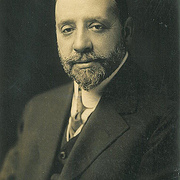Morris Jastrow, Jr. (1861–1921)
Autor von An Old Babylonian Version of the Gilgamesh Epic
Über den Autor
Reihen
Werke von Morris Jastrow, Jr.
The civilization of Babylonia and Assyria; its remains, language, history, religion, commerce, law, art, and literature (1915) 21 Exemplare
The War and the Bagdad Railway, the Story of Asia Minor and Its Relation to the Present Conflict. (2007) 6 Exemplare
Zionism and the Future of Palestine: The Fallacies and Dangers of Political Zionism (1919) 5 Exemplare
The Book of Job 1 Exemplar
Zugehörige Werke
Getagged
Wissenswertes
- Gebräuchlichste Namensform
- Jastrow, Morris, Jr.
- Geburtstag
- 1861-08-13
- Todestag
- 1921-06-22
- Geschlecht
- male
- Nationalität
- Poland (birth)
USA (residence) - Geburtsort
- Warsaw, Poland
- Sterbeort
- Jenkintown, Pennsylvania, USA
- Wohnorte
- Philadelphia, Pennsylvania, USA
- Ausbildung
- University of Pennsylvania (BA|1881)
University of Leipzig (Ph.D|1884)
Sorbonne - Berufe
- orientalist
Professor of semitic languages
librarian - Beziehungen
- Jastrow, Marcus (father)
Jastrow, Joseph (brother) - Organisationen
- American Oriental Society
University of Pennsylvania
Mitglieder
Rezensionen
Auszeichnungen
Dir gefällt vielleicht auch
Nahestehende Autoren
Statistikseite
- Werke
- 27
- Auch von
- 1
- Mitglieder
- 195
- Beliebtheit
- #112,377
- Bewertung
- 3.8
- Rezensionen
- 2
- ISBNs
- 59
- Sprachen
- 2












This book goes far beyond that. The appendix at the end lists about ninety different insertions, some of them of one or two words (glosses which are surely too short to identify clearly), some of them lasting for many verses (including even the larger part of the famous poem about a time and season for everything).
I can't help but think that this goes too far. Jastrow's analysis of the personality of Koheleth ("The Preacher") is probably mostly correct, but the literary analysis is simply too nitpicky. In many ways, this is an interesting book. But I would far rather see a commentary on Ecclesiastes-as-canonized than on Ecclesiastes-as-edited-by-Jastrow. Even if Koheleth did not write that there is a time to weep and a time to laugh, surely it is a point worth remembering!
And I do think that Jastrow sometimes gets things wrong, too. Take the thesis of the entire book: "Vanity of vanities, all is vanity." (An incredibly difficult phrase to translate -- in the Hebrew, the word means something like "mist" or "vapor" -- something as light as air, that mixes in air, that cannot be separated from air. But "Vapor of vapors, all is vapor" doesn't really get the point across. "Vanity of Vanities" -- nothing of nothings, but a thing on which we dote -- translated the feeling if not the words.) In the actual Hebrew text it opens the book, and it also closes the book except for all those silly accretions at the end. And yet Jastrow cuts it out at the beginning, thinking Koheleth saved it for the end as a summary. Yes, it's a summary, but it's also Koheleth's thesis. It needs to be at the beginning. And, in Jastrow's text, it isn't. That really is one edit too many.… (mehr)